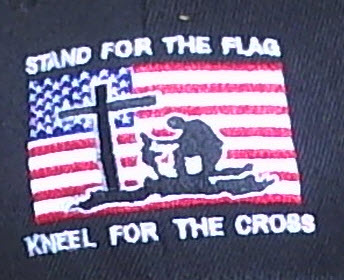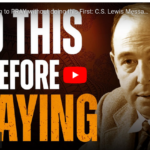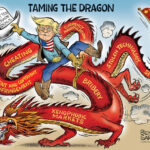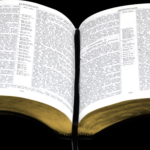Thomas Campbell (father) Alexander Campbell (Son and most Notable)
Thomas Campbell (father) Alexander Campbell (Son and most Notable)
There have been many American Pastors, but this father son pair were very instrumental promoting the Christian Faith in Early America.
\m Thomas Campbell Thomas Campbell
Alexander Campbell -Son
The material for this article was gathered from Wikipedia and Christianity Today
“The union of Christians with the apostles’ testimony is all-sufficient and alone sufficient to the conversion of the world.” – Christianity Today
Separated by the Atlantic Ocean, Presbyterian preacher Thomas Campbell and his son Alexander simultaneously came to the same conclusion: the future was not with Presbyterianism. Why these two Irish men concluded that, and what they did about it, created one of the most powerful movements in American religious history—and a uniquely American denomination.
Just Christians
The plan was for Thomas to sail to America first with his family to follow later. But the ship cariying Campbell’s family was shipwrecked, and they had to spend a year in Scotland. There, 19-year-old Alexander answered the call to preach and began studying at the University of Glasgow. He quickly became disgusted with what he perceived to be theological pettiness in Presbyterianism. One Sunday he refused Communion, symbolically breaking with the faith of his father.
When Alexander finally arrived in Pennsylvania, though, he discovered his father had also seceded from the local presbytery! One reason: a perceived lack of scriptural support for infant baptism. Thomas had founded The Christian Association of Washington (County, Pennsylvania). “Where the Scriptures speak, we speak,” declared Thomas, “where the Scriptures are silent, we are silent.”
In 1811, Alexander began pastoring Bull Run Church, a group of Presbyterian refugees. The birth of his first child led him to reconsider his views on infant baptism. He decided that his own infant baptism was invalid, so he sought out a Baptist minister to immerse him as an adult believer. His church then joined the local Baptist association.
Timeline
• 1740 Great Awakening peaks
• 1771 Francis Asbury sent to America
• 1779 John Newton and William Cowper publish Olney Hymns
• 1788 Alexander Campbell born
• 1866 Alexander Campbell dies
• 1870 First Vatican Council declares papal infallibility
Alexander traveled on horseback through the Midwest and South, preaching a simple gospel stripped of “dogma” and “creeds.” In 1823 he launched The Christian Baptist, a monthly that, wrote editor Campbell, “shall espouse the cause of no religious sect, excepting that ancient sect ‘called Christians first at Antioch.’”
That purist spirit eventually drove a wedge between Campbell and the Baptists, but it created an affinity with Barton Stone and his followers, some 10,000 strong and known simply as “Christians.” They too were championing a “restoration” of primitive Christianity. Stone’s followers and Campbell’s (some 12,000 known as “Disciples”) merged in 1832 to form a loosely organized group of independent-minded churches committed to primitive Christianity—eventually called the Christian Church (Disciples of Christ).
The Bible alone
Campbell’s evangelistic methods were varied, to say the least. A life-long debater, Campbell once sparred with popular atheist Robert Owen, delivering an address on the evidences of Christianity that lasted 12 hours! Later Campbell visited Owen and pleaded with him to accept the Christian faith; Owen wouldn’t budge, though Campbell’s appeal allegedly moved him to tears.
Perhaps Campbell’s most important work was launching and editing The Millennial Harbinger. The journal defined and fueled the Restoration movement’s spectacular growth, from about 22,000 in 1830, when the journal was launched, to over 200,000 in the year of Campbell’s death.
In 1840 Campbell chartered Bethany College in Bethany, Virginia, to provide more education for ministers. He published a translation of the New Testament (1827), and wrote several books, including The Christian System (1839) and Christian Baptism (1854).
In The Christian System, he elaborated on the principles that drove him all his ministry. He was deeply disturbed by denominationalism: “In what moral desolation is the kingdom of Jesus Christ! Was there at any time, or is there now, in all the earth, a kingdom more convulsed by internal broils and dissensions than what is commonly called the church of Jesus Christ?”
He sought desperately to get back to a “simple evangelical Christianity,” founded on the Bible and the Bible alone. Only this—not creeds or confessions or liturgy—could bring unity to Christians: “The testimony of the Apostles is the only and all-sufficient means of uniting Christians.” And only in unity could Christians effectively evangelize: “The union of Christians with the apostle’s testimony is all-sufficient and alone sufficient to the conversion of the world.”
Campbell’s emphasis on New Testament Christianity appealed powerfully to frontier Americans—and to many Christians since.
Alexander Campbell (clergyman) Alexander Campbell (12 September 1788 – 4 March 1866) was a Scots-Irish immigrant who became an ordained minister in the United States and joined his father Thomas Campbell as a leader of a reform effort that is historically known as the Restoration Movement, and by some as the “Stone-Campbell Movement.”.
Alexander Campbell (clergyman)
From Wikipedia, the free encyclopedia Alexander Campbell around 1855
Alexander Campbell (12 September 1788 – 4 March 1866) was a Scots-Irish immigrant who became an ordained minister in the United States and joined his father Thomas Campbell as a leader of a reform effort that is historically known as the Restoration Movement, and by some as the “Stone-Campbell Movement.” It resulted in the development of non- denominational Christian churches, which stressed reliance on scripture and few essentials. Campbell was influenced by similar efforts in Scotland, in particular, by James and Robert Haldane, who emphasized their interpretation of Christianity as found in the New Testament. In 1832, the group of reformers led by the Campbells merged with a similar movement that began under the leadership of Barton W. Stone in Kentucky. Their congregations identified as Disciples of Christ or Christian churches. Several American church groups have historical roots in the Campbells’ efforts, including the Churches of Christ, the Christian churches and churches of Christ, and Evangelical Christian Church in Canada,[3][4] the Christian Church (Disciples of Christ). Alexander Campbell also founded Bethany College in what became Bethany, West Virginia.
Early life and education Young Alexander Campbell
Alexander Campbell was born 12 September 1788 near Ballymena, in the parish of Broughshane, County Antrim, Ireland. His parents were Thomas Campbell and Jane Corneigle Campbell, who were of Scots descent. Like his father, he was educated at the University of Glasgow, where he was greatly influenced by Scottish Enlightenment philosophy. He was also influenced by the English philosopher John Locke. In 1809 at the age of 21, Alexander emigrated to the United States with his mother and siblings from Scotland, to join his father Thomas, who had emigrated there in 1807. They sailed from Scotland on the Latonia on 3 August 1809 and landed in New York City on 29 September, then traveled overland to Philadelphia. They continued to western Pennsylvania, where the senior Campbell was serving as a minister in Washington County on the frontier. Alexander was ordained by his father’s Brush Run Church on 1 January 1812.
Marriage and personal life
The year before, Campbell had married Margaret Brown on 12 March 1811. Margaret’s father John Brown owned a significant amount of land in the Bethany, Virginia area (now in West Virginia). The couple resided in what is now known as the Alexander Campbell Mansion near Bethany, and had eight children. Their first child, a daughter, was bom on 13 March 1812. His daughter’s birth spurred Campbell to study the subject of baptism. He ultimately concluded that scripture did not support the baptism of infants. He came to believe that individuals had to choose conversion for themselves and baptism was not appropriate until they did so.
After the death of Margaret in 1827, Campbell married again the next year, to Selina Huntington Bakewell on 31 July 1828; they had six children.
Public life: Alexander Campbell From 1815 to 1834,
Campbell and his father kept the Bmsh Run Church affiliated with a local Baptist association. After disagreements over some issues, they allied with the Mahoning Baptist Association.
Campbell’s only formal political service was as a delegate to the Virginia Constitutional Convention of 1829-1830, held in Richmond. He met some of the leading politicians of the day and was invited to preach in several churches in the capital city.
In 1840, Campbell founded Bethany College in Bethany, Virginia (now West Virginia). He believed that the clergy should be college educated. Many future leaders of the Disciples of Christ and Churches of Christ graduated from the college, although some latter congregations did not attach the same value to theological study and professional clergy.
Campbell visited the United Kingdom in 1847. During the trip he gave public lectures in England and Scotland. He went to Ireland to deliver funds that U.S. Restoration Movement churches had raised for relief in the Great Famine. While at Glasgow, he was challenged by James Robertson[which?] to a debate on the subject of slavery, which the American South protected. As a result of the fierce exchange, Robertson sued Campbell for libel. The American denied the charge, but he was arrested and imprisoned for ten days. Campbell was released when the warrant for his arrest was declared to be illegal. The case was ultimately tried, and the jury decided in his favor.
Death and legacy
Alexander Campbell died on March 4, 1866 at Bethany, West Virginia. His widow died more than three decades later, on June 28, 1897. His nephew Archibald Campbell (1833-1899) had already become an important abolitionist and Republican party leader, and as editor of the Wheeling Daily Intelligencer helped found what became the state of West Virginia.
Alexander Campbell, age 65
While in his early 20s, Campbell wrote several moral essays under the pseudonym “Clarinda.” and published them in a local paper. In 1820, his debate with the Presbyterian John Walker was published, reminding him of the efficacy of writing and publishing. He bought a press and built a small print shop in 1823, establishing what proved to be a successful publishing operation.
Campbell edited and published two journals. The first was the Christian Baptist, which he edited from 1823 through 1830. The second was The Millennial Harbinger, which he began in 1830 and continued to edit until his death in 1866. He became less active in it during the 1850s. In both, he advocated the reform of Christianity along the lines as it was practiced on the American frontier. He encouraged contributions by writers who thought differently from him, and the journals encouraged a lively dialogue about issues in the reform movement.
Campbell expanded his printing operation in 1830 for the Millennial Harbinger.The change from the Christian Baptist to the Harbinger was prompted by several concerns.
Differences of opinion were arising between Campbell and the Baptists, and in many cases Baptist associations were expelling persons connected with the Campbell movement. He was concerned that “Christian Baptist” – which he considered to be less appropriate than the biblical term “Disciples” – was becoming the de facto name of the group. He also wanted the new journal to have a more positive tone, promoting reform and preparing the world for the millennium and the second coming of Christ.
Campbell wrote several books, including The Christian System. He also wrote hymns, including “Upon the Banks of Jordan Stood”. Campbell compiled and published a translation of the New Testament under the title The Living Oracles. Published in 1826, it was based on an 1818 translation by George Campbell, James MacKnight and Philip Doddridge, and included edits and extensive notes by Campbell.
Public debates
For a time, Campbell was wary of public debates. In June 1820, he debated with Rev. John Walker, a Baptist preacher, at Mount Pleasant, Ohio, on baptism, and since then, regularly participated in debates. Some of them gained national and international attention after their transcripts were published. In 1823, he debated with Rev. William L. McCalla, a Presbyterian minister, on infant baptism; in April 1829, with Robert Owen on socialism and Christianity; in January 1837, with Archbishop of Cincinnati, John Baptist Purcell on Protestantism and Roman Catholicism; in September 1843, he defended the Restoration Movement in a debate with Rev. Nathan L. Rice, who represented traditional Presbyterianism.
Legacy and honors
Campbell was instrumental in the Restoration Movement, which resulted in a new direction for American Christians and founding of numerous new, non-denominational churches as well as the Christian Church (Disciples of Christ). His house in Bethany, West Virginia, the Alexander Campbell Mansion, was designated as a National Historic Landmark. Campbell is known to have preached at the Slash Church, now on the National Register of Historic Places in rural Hanover County,






Leave a Reply
You must be logged in to post a comment.